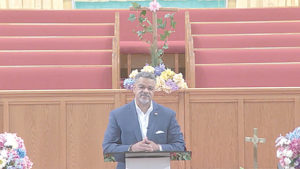By Allison Perrine
RED BANK – Two River community members have decided – enough is enough.
At Pilgrim Baptist Church June 4, local leaders came together to have a frank conversation about systemic racism in the U.S. Some gave personal accounts of what it’s like for people of color in the U.S. Others spoke about how to do better in the future.
“Much of what’s happened in America is because of systemic racism. That’s not just a part of law enforcement, but it’s a part of the very fabric of this nation,” said Rev. Terrence K. Porter, senior minister of Pilgrim Baptist Church.
The night began as Porter shared the stories of various unarmed black Americans who have recently died at the hands of law enforcement. Then he reflected on similar violence toward people of color during the civil rights movement when blacks struggled for the same rights as whites. Police departments were militarized and given the authority to suppress the movement, often with violence, Porter said.
“They don’t like to talk about that in our schools. They don’t want that part of our history to be exposed, but it’s the reality of being black in America,” said Porter. “What happened to George Floyd was a part of what’s been happening in America for many, many generations.”
Mayor Pasquale Menna reflected on his life in Red Bank during the civil rights movement. At that time, he looked out the window from his parents’ apartment and saw the former mayor, police chief, Pilgrim Baptist leader and others linking arms and coming together as one during a divided time. Now, decades later, he and the borough again stand in unity with communities throughout the country.

“There will be justice – we are hoping and praying for justice and we will demand justice so that what transpired is not repeated again,” said Menna. “The nation has a systemic history of degradation, of violence, of repression against people of African American heritage and Native Americans and others. I think the earliest that we can come to grips with that…the sooner we can get to that point we will be able to walk together toward the finish line of achieving a greater society.”
Red Bank Police Chief Darren McConnell said law enforcement agencies across the county, Red Bank included, “are saddened by and surely condemn” the acts of the police officers involved in Floyd’s case and others. It’s important to him to have a healthy and positive relationship between community members and the police department, he said. That’s why the department has prioritized community outreach programs like it’s translator program to help communicate with English as a Second Language (ESL) speakers.
Programs in the schools have been important as well to “hopefully provide a role model” to the children and show them that police officers are people, too they are parents with families and lives outside of their uniforms.
“Police officers are human beings. We all have stressors. We all have families at home. We all have issues that we deal with outside of the police department and then we come here and have to try to put those stressors away so they don’t affect our job,” said McConnell. “We have to be aware just as we have to be aware of our stressors in our life and how they affect us we have to be aware of our implicit bias and how it affects law enforcement.”
He also highlighted the difference between the art of policing and the science of it. “A lot of people know how to police and the rules of policing, but if you don’t do the art of policing right, you’re not going to be successful as a cop and you’re not going to get the support of the community,” said McConnell.
And McConnell showed his art of policing after a tense encounter among select Red Bank officers and residents, according to Red Bank Council president Michael Ballard, who is black. During the livestream, Ballard shared an “unacceptable” experience that he and his wife, who is white, had with borough police the previous night, before McConnell and Lt. Juan Sardo arrived and deescalated the scene.
According to Ballard, his wife was trying to console her niece at a traffic stop. The young woman was upset and scared because she had a traumatic experience with the police before. She was crying for her aunt to stay by her side.
“She just felt that the Red Bank police officers at that time were not being as compassionate as they could be and felt they were a little overly aggressive,” he said. “And in her frustration, as she (his wife) turned and walked away, she said and loudly ‘I am tired of these Red Bank police officers disrespecting residents.’ ” That’s when she was handcuffed, Ballard said. “From my vantage point, this was an act of over aggression.”
Ballard said he had a long talk with McConnell after the incident and together, they will work to move the community forward.
Monmouth County Prosecutor Christopher J. Gramiccioni reviewed the ways that his office is working to implement innovative and bias-free policing. For example, all sworn-in law enforcement officers have undergone implicit bias training since 2017. Assistant prosecutors will soon undergo the same training, he said. Additionally, all police officers are required to undergo annual cultural and ethnic sensitivity and diversity training.
Since 2012, the prosecutor’s office has criminally prosecuted about 25 police officers, he said. But one of its most important functions when prosecuting an officer, he added, is seeking forfeiture from public office so that they cannot serve again.
Closing out the night, Nina Norman, a mother of four children who grew up and graduated from schools in Monmouth County, shared her fears as a black woman raising black children in a predominantly white community. Her children’s careers range from upper management in a Fortune 500 company, to an essential worker in two local hospitals pursuing a nursing degree, an HR recruiter in the medical industry and a full-time student and intern, she said.
“However, because of their color, the color of their skin, they are judged by their race opposed to their character and accomplishments,” said Norman. “A black mother fears raising a child in a white privilege society. We fear letting our children into the world, knowing the world fears our children.
“It’s time society realizes the challenges and fears faced in the black community. We must have difficult conversations with other ethnicities to eradicate the fears and move forward to justice,” said Norman.
Everyone, not just black people, must be “outraged” before change can occur, which she said “speaks volumes” about the current system of justice.
“We can’t make change on our own. We need everyone to speak out against racial profiling, systemic racism and realize that Black Lives Matter,” Norman said. “I pray we have finally reached this point in society, in our nation, so a black mother doesn’t have to continue to fear for her children and so our children don’t have to fear being black in America.”
The article originally appeared in the June 11 – 17, 2020 print edition of The Two River Times.














